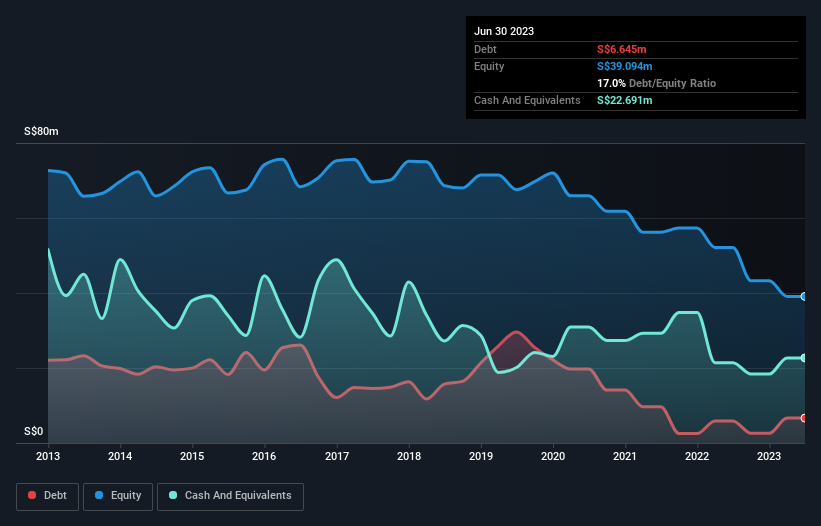Is TeleChoice International (SGX:T41) A Risky Investment?
The external fund manager backed by Berkshire Hathaway's Charlie Munger, Li Lu, makes no bones about it when he says 'The biggest investment risk is not the volatility of prices, but whether you will suffer a permanent loss of capital.' When we think about how risky a company is, we always like to look at its use of debt, since debt overload can lead to ruin. As with many other companies TeleChoice International Limited (SGX:T41) makes use of debt. But should shareholders be worried about its use of debt?
When Is Debt Dangerous?
Generally speaking, debt only becomes a real problem when a company can't easily pay it off, either by raising capital or with its own cash flow. Part and parcel of capitalism is the process of 'creative destruction' where failed businesses are mercilessly liquidated by their bankers. While that is not too common, we often do see indebted companies permanently diluting shareholders because lenders force them to raise capital at a distressed price. Of course, debt can be an important tool in businesses, particularly capital heavy businesses. When we think about a company's use of debt, we first look at cash and debt together.
See our latest analysis for TeleChoice International
What Is TeleChoice International's Net Debt?
As you can see below, at the end of June 2023, TeleChoice International had S$6.65m of debt, up from S$5.88m a year ago. Click the image for more detail. But it also has S$22.7m in cash to offset that, meaning it has S$16.0m net cash.

How Strong Is TeleChoice International's Balance Sheet?
We can see from the most recent balance sheet that TeleChoice International had liabilities of S$64.6m falling due within a year, and liabilities of S$1.50m due beyond that. On the other hand, it had cash of S$22.7m and S$62.5m worth of receivables due within a year. So it can boast S$19.1m more liquid assets than total liabilities.
This excess liquidity is a great indication that TeleChoice International's balance sheet is almost as strong as Fort Knox. Having regard to this fact, we think its balance sheet is as strong as an ox. Succinctly put, TeleChoice International boasts net cash, so it's fair to say it does not have a heavy debt load! When analysing debt levels, the balance sheet is the obvious place to start. But it is TeleChoice International's earnings that will influence how the balance sheet holds up in the future. So if you're keen to discover more about its earnings, it might be worth checking out this graph of its long term earnings trend.
In the last year TeleChoice International wasn't profitable at an EBIT level, but managed to grow its revenue by 18%, to S$235m. That rate of growth is a bit slow for our taste, but it takes all types to make a world.
So How Risky Is TeleChoice International?
Although TeleChoice International had an earnings before interest and tax (EBIT) loss over the last twelve months, it generated positive free cash flow of S$14m. So taking that on face value, and considering the net cash situation, we don't think that the stock is too risky in the near term. The next few years will be important as the business matures. The balance sheet is clearly the area to focus on when you are analysing debt. But ultimately, every company can contain risks that exist outside of the balance sheet. For example TeleChoice International has 3 warning signs (and 2 which are a bit concerning) we think you should know about.
When all is said and done, sometimes its easier to focus on companies that don't even need debt. Readers can access a list of growth stocks with zero net debt 100% free, right now.
Valuation is complex, but we're here to simplify it.
Discover if TeleChoice International might be undervalued or overvalued with our detailed analysis, featuring fair value estimates, potential risks, dividends, insider trades, and its financial condition.
Access Free AnalysisHave feedback on this article? Concerned about the content? Get in touch with us directly. Alternatively, email editorial-team (at) simplywallst.com.
This article by Simply Wall St is general in nature. We provide commentary based on historical data and analyst forecasts only using an unbiased methodology and our articles are not intended to be financial advice. It does not constitute a recommendation to buy or sell any stock, and does not take account of your objectives, or your financial situation. We aim to bring you long-term focused analysis driven by fundamental data. Note that our analysis may not factor in the latest price-sensitive company announcements or qualitative material. Simply Wall St has no position in any stocks mentioned.
About SGX:T41
TeleChoice International
An investment holding company, provides various info-communications services and solutions for the consumer and enterprise markets in Singapore, Indonesia, Malaysia, the Philippines, Hong Kong, and internationally.
Excellent balance sheet with proven track record.
Market Insights
Community Narratives



